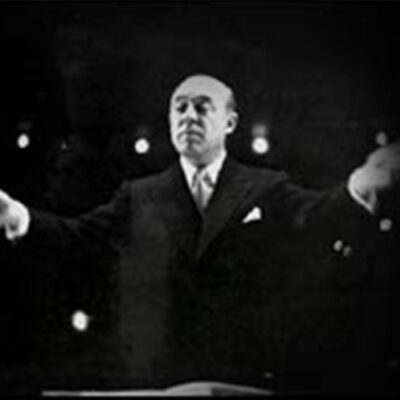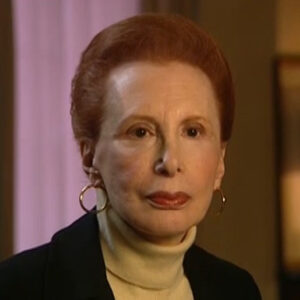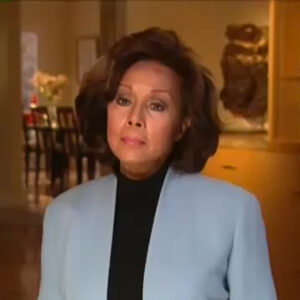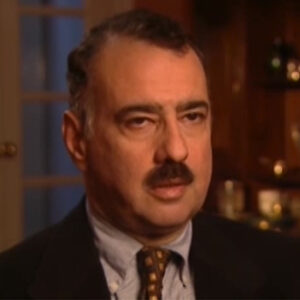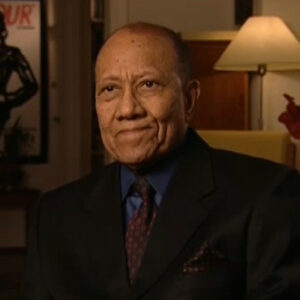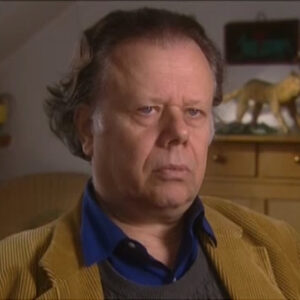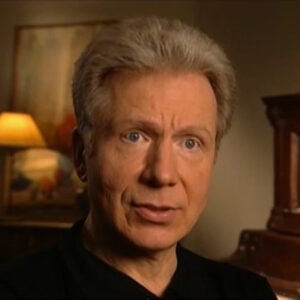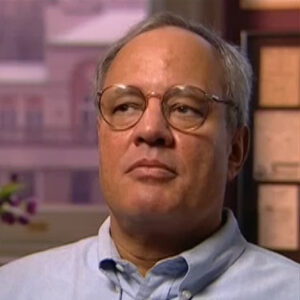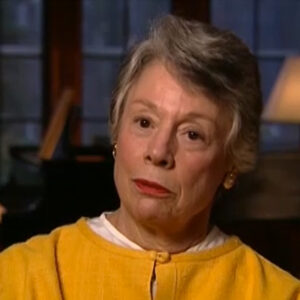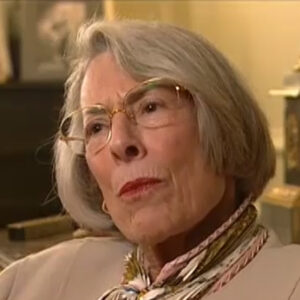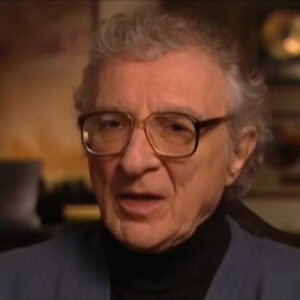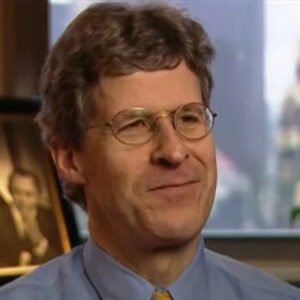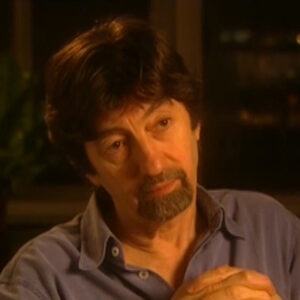Speaker 1 I just I grew into show business. I started going to matinees. I must have been about seven or eight. And every Saturday matinee Saturday, my father went to work because in those days, people worked on Saturday. So at noon time he are in the morning. He’d say, I have to go to New York. And my mother would say, take Max with you, because she knew I didn’t play baseball. I hated baseball. So he’d say fine, and he’d take me in in New York and I’d sit in his office, which is at fourteen seventy six Broadway. And he would call my cousin, who was about four years older than I was, and he would take me and my cousin and he would write us a little note and say, go over to the George M. Cohan Theater and hand this note to the box office man. And we take the note in and the guy would say, oh, here the kids again. And he’d say, stand over there until the until the audience had filed in. And there were a few empty seats in the House. And inside you could hear the orchestra striking up and the door would open and an usher would reach your hand out and say, come on in here, and we would be dragged inside and put at the end of the row wherever there was some empty seats. And we’d sit there and we saw musicals, musicals, musicals. And we’re like every week there was some musical to see. And I was very, very infected by music. I don’t know why. It was just something that I responded to immediately and I’d come home humming the songs. I had no idea that I had that kind of a memory. And that was when I first became aware of Rodgers and Hart.
Speaker 2 OK, let’s stop for one second because you tell us that it was the 20s and that you were a little kid. And tell us what how many shows were on Broadway. I mean, you don’t have to give us that. You know, just say there were thousands. Hundreds. What did it seemed to talk about? Yeah, musical comedy.
Speaker 1 Well, musical comedy in those days was was the the simplest kind of show you could get to because every comedy star had a show. Edwin had a show. Fanny Brice had a show. Clark and McCulloh, they were the they were the funniest man I ever saw on a stage. Bert La had a show. The Phil Phil Baker had a show Joe Cook had to show everybody. All you needed was a comedian to drive the show and then you get Willie and Eugene Howard or you get any of those. All of those people thrived in musical comedies. And one of the big problems today, of course, is that you revived these shows and you don’t have the comedians. And these were these were comedian driven shows. Lou Holtz, I mean. My education growing up as as a kid was to watch comedians, and it was fascinating. I was Jimmy Durante. I thought he was the funniest man I ever saw on a stage, and I still do. He was an anarchist. He was brilliant. And and the audience adored him. You pick up a piano, he would tear the piano apart and throw the pieces into the orchestra pit and scream. And then Ethel Merman would come out and they would do a duet together. And in honor of Jimmy, I wrote a book called Don’t Raise the Bridge, Lower the River, because I said, This is the great American philosopher. And he was so pleased when I showed him the book, he said, You immortalized me. I said, yes, because you deserve being immortalized. Edwin was the same way. If you walked into a theater with that when you started seeing jokes right away, he would have a thing in the lobby that said, my latest invention for making a hole in one. And there was a revolver in and suspended there. He would come out and say, I have this 11 foot pole. It’s four people you wouldn’t touch with a ten foot pole. Oh, please. He had he had a shoe with a little pair of of like a lawnmower at the end of the show, he said this is for people who don’t want to let grass grow under their feet. And I mean, Ed was a delight for come for comedians and for for kids like me. He was hilarious.
Speaker 2 Let me ask you actually, listen, I have one speech. Tell me how old you were when you first introduced a writer, started to mention them by name and what was what was I?
Speaker 1 I think I was about nine years old when I first heard Rodgers and Hart, and it was at a summer camp where I went where they had an orchestra that used to play songs of the day. And one of the songs was called I’ve Got Five Dollars and I got that or or you took advantage of me. And I didn’t know where these songs came from. But they were so they were so snappy and so funny that I went back to New York. I went back. I didn’t live in New York. I lived in Scarsdale. And then I went to see a show called America’s Sweetheart. And there they were. And there was a guy named Jack Whiting singing I’ve got five dollars. You know, it was a typical song and dance man. Everything he did with the hands and everything. And and and this was traditional. That was he was not the comedian. He was the love interest. Oscar Shaw and Mary Fields, I believe, where the other team that did all that. But the thing about those Rodgers and Hart songs was you heard them and they stayed with you. They really stayed with you. The lyrics were brilliant. And and Dick wrote wonderful music for him. And I think there’s a period and in the Rodgers and Hart for which they like to call it, where these songs just bounce all over the stage. They’re so cute. They’re so clever. And and Larry’s lyrics just get right to you. They’re they’re they’re performers dreams to get out and do those songs and. It goes all the way up through their career, they were perfectly fitted to each other and they did wonderful Broadway shows and then, of course, came the Depression and they got stuck in New York. So they had to go to California, where, of course, nobody knew what the hell to do with them because they were too smart for broad front for the Hollywood scene.
Speaker 2 I want to get to Hollywood in a second. Tell us just quickly, tell us in the 20s what when Rodgers and Hart were trying to break in to Broadway. Who are they competing against? What was that? Oh, God. How did they do? How are they distinguished from the others? What’s the difference?
Speaker 1 Well, the only way they had done a lot of shows of their own and they did The Garrick Gaieties, and then they began to do shows of their own, like Connecticut Yankee and stuff like that. They also had a tough period because there was a show they had to do called Betsy with Belle Baker and Belle Baker. Flo Ziegfeld produced it for Bill Baker, and Belle was very unhappy with that score, which in retrospect is crazy because it’s got one of the greatest songs that Larry Hart ever wrote in the score is called This Funny World, but on opening the night before opening night. Bell called Irving Berlin and said, I need a Bell Baker song and I don’t have one for next to closing the 11:00 numbers in the air. And this story is, you know, is now known. Everybody knows that he came over to the apartment and said, I have a half a song. It’s it just got bom bom bom bom bom bom bom bom bom bom bom bom. And he didn’t have the middle and she said, well, you got to get me a middle. We’ve got to finish this song. So Bell and and Irving Berlin and Maurice Abrahams, who was Herbie who was Herbie Baker’s father, sat at the piano working and working and working. And at about midnight or one o’clock in the morning, they came up with the the middle bridge. Da da da da da da da da da da da da da da da da da. And she said, that’s it, that’s it. I’m going to do it. And the next morning she called Flo Ziegfeld and Ziegfeld said, go ahead, Bell put it in the show and she put it in the show. And Rodgers and Hart came to the theater that night not knowing that that was going to be an interpolation. And it was in and it stopped the show dead at quarter 11. And according to Bell, she did about 23 reprices and everything else, but when I asked Mr. Rogers about it, he said, well, it wasn’t quite that many, but we were very disturbed because no one had told us that she was going to do this. And of course, having blue skies didn’t didn’t hurt, but it hurt because we didn’t know it was going to be there. And in those days, they did interpolations. They don’t do that anymore. But that’s the earliest contact I had with Rodgers and Hart in that show, mainly through the fact that I knew Herbie Baker, who told me the story. He was seven or eight at the time. I then started saying, Rodgers and Hart, every time there was a show, I would go like I was faithful. I just thought that were fantastic. Then they went to California and there was sort of lost for a while. And the story of what you know, I believe they went to Warner Brothers, which was not a place for them to be, and Jack Warner said to them boys, what I want from you is a lot of hits, write me hits, big hits. Well, they should have known Rick right away. The Jack Warner was not their absolute type of person to be working for, and nor were any of the others for a lot of reasons. They didn’t do well at Metro and they didn’t do well at Paramount. They had to phone their songs in at Paramount because they’d already gone back to New York. They were very depressed out there. Everybody was supposed to be wonderful for songwriters in Hollywood, but they were too classy. They were really much too good for the Hollywood scene that they the last time they had a job at Warner Brothers was a show called Fools for Scandal, which was a movie with Fernan Gravy. And I think Carole Lombard, if I’m not mistaken, and it has a couple of songs in it that are really very good songs that nobody ever hears because it was they were buried. They were ignored. They were you know, it was it must have been horrible for them to be out there. And then when they came back to New York and did Jumbo, they suddenly came back into their own.
Speaker 2 Did you ever talk to Rodgers about his time in Hollywood?
Speaker 1 Oh, yeah.
Speaker 2 He used to tell me what he would say to you.
Speaker 1 He just said, I’d like to forget it. It was so ugly. I didn’t really like it at all. I mean,
Speaker 2 this is one of those times I need the subject. Say, Hollywood.
Speaker 1 Hollywood was Hollywood was not the right place for them. They were too they were too smart. You know, Larry Hart, even even when they did, what’s the name of that movie that the boys from Syracuse, which they bought and made us a movie at Universal with Joe Panner. Terrible movie that caught most of the Rodgers and Hart songs, and, you know, you go to this and you see a piece of work that’s been eviscerated because they just didn’t know what to do with their stuff. So they end up writing one movie called Mississippi, I believe it is with with W.C. Fields and Bing Crosby. And they’ve got three songs in it that are quite beautiful. But they’ve already gone back to New York because they can’t they can’t deal with Hollywood anymore. And I don’t blame them at Hollywood. Broke a lot of people’s hearts for that kind of stuff, especially songwriters.
Speaker 2 Tell me again what he told you and used the word Hollywood, Hollywood, make it a conversation between he and you about what Hollywood was like.
Speaker 1 Well, Dick felt that Hollywood was a place where the people who ran the business had no taste for what they wrote and they were constantly being know what? See, it’s it goes back to another experience. They did a movie with Jeanette MacDonald and and Maurice Chevalier with Reuben Mamoulian, which is one of the greatest movies I’ve ever seen. And it keeps running and running and running. That movie broke all sorts of trails.
Speaker 2 The dialogue stopped because I need I need the title.
Speaker 1 So love me. Love me tonight. Thank you.
Speaker 2 Can you start? Yeah. They did a movie,
Speaker 1 Love, Love Me Tonight is one of the best musicals I’ve ever seen and I could see it over again every night because it is so charming and brilliant and witty. This has dialogue which is in rhymed couplets. It has all sorts of things that go into the realm of let’s try this and see how it works and it works. It’s brilliant. Now they had that. Movie, and they had nothing but respect at Paramount for doing this movie, and then after that the movie disappears and they go back to New York and they do a couple of shows and then they come back to Hollywood and they’re ignored. Now, they made another movie, which is called Hallelujah, I’m a Bum with Al Jolson. Now, you may not you know, not many people know about this movie, but it’s another one of those trailblazing movies where the dialogue is chanted and sung and talked and it’s a love story. And even Jolson agreed that this was a wonderful movie to make. And it has one of the most beautiful songs on it that’s ever been written, called You Are Too Beautiful for One Man Alone. They had been treated with enormous respect when they made this picture. The picture was a terrible flop. So they were considered a too high toned, too fancy. They don’t want this kind of stuff. What they want at studios is ballads that you can sing with Dick Powell and and somebody can do you know, Alice Faye can do a number or name it, that this is what we write. We write musicals. They do not want the smart Broadway stuff. So smart Broadway stuff disappears and Dick and Larry are left without anything. They’re not. When you say, what were they treated like in Hollywood? They’re treated like two smart people who haven’t got a place to hide. Right. So they end up making one more disaster called Hollywood Party, which. I read an anecdote about Hollywood party the other day. They had all the footage put together, five or six directors had worked on it, but none of them wanted their name on the picture. So they called in a director named Alan Dwan and Alan Twan sat in the projection room and ran all the footage of this picture that had been made with Jimmy Durante and with with this one and that one. And nobody knew what to do with it. They didn’t know what the hell they were doing. And he sat there and looked at the footage for 12 hours. And then he sat there and he said, you know what, this is this is a nightmare. It’s a bad dream. And Louis Mayer hurt him. And Louis Mayer came into the projection and said, that’s it, do it. It’s a nightmare. It’s a bad dream. Put it together like that. And we’ve got we can get it out. And Dwane said, OK, got a big fat check. He cut the picture together. He’s the nonono. The director’s name is on the picture because they won’t take no one will take credit for it. But that’s what it was. It was a bad dream. It was a nightmare to do pictures like that. And that’s when these guys decided they better go back to New York. And they wrote a song called I’ve Got to Get Back to New York. Have you ever heard it? It’s it’s it’s them saying, I’ve got to get back to New York. Dick never liked to talk about Hollywood. He really hated it, and every time I called him up one day and I said I just saw, I just saw Hallelujah, I’m a bum again. And I really am impressed with it. There’s a tape of it sitting over there. And he said it has had its share of fans and aficionados over the years. He said sort of bitterly because he knew that it’s you know, it’s it’s up on the shelf. It’s never going to be shown anywhere. But it’s a beautiful, brilliant picture.
Speaker 2 Talk about Blue Moon and its its genesis cut being added. And then finally, the Jack Robin story, Blue Moon.
Speaker 1 Blue Moon started as Dear Lord, please make me a star. I believe it was supposed to be in Hollywood party, which goes Hollywood party. Get out, get out, get in it. You know, I’m the only person who can remember these dreadful lyrics. And then they took it out of that and they put it in another movie sung by who was the third? The second singer I can’t remember. Shirley and Shirley Ross sang it. And it’s called The Bad. And every man and Larry came back to New York. They had a publisher named Jack Robins. And Jack Robins was a very blunt man. And he said, you know, Larry, you’ve got to write hits. The problem is you don’t write hits. Now I want you to write me a hit. He said put stuff in it like moon and blue and spoon and put all the stuff that makes a ballad. So Larry came back with a song called Blue Moon. It’s the biggest hit they ever had. It was a major popular hit. And and Jack Robin said, you see, I told you that’s what you needed to do. Larry hated doing stuff like that. Larry is it’s always been questioned as to why he wrote a song called Lover When I’m Near You, when I hear you speak my name softly in the air, I breathe the flame. Well, you know what happened with that? She had Jeanette MacDonald had that in a movie called Call Love Me Tonight. And there was no lyrics. She just said, da, bom, bom, bom, bom. There’s one of Dick Rogers waltzes. He loved to write waltzes, but it had no lyrics. And the guy and and and Larry was in New York and they got a call from Paramount. I said, we need some lyrics for that. We’ve got to put it. We have to give us some lyrics. So Larry, being Larry would say lover, when I’m near you and I hear you speak my name, get it out of here. He didn’t want it. He didn’t care what it was. And that’s what everybody starts yelling at him for, writing a lyric. He wrote a lyric to order to get the song published because the publisher said Paramount Music said there’s no lyric to this. We need a lyric, that’s all. And, you know, it’s still a beautiful song. And they wrote beautiful music and beautiful lyrics,
Speaker 2 mounting a show when they come back. What happens when they come back? Give me the 1934
Speaker 1 1935 we are we are going to we’re going to talk about Jumbo because Jumbo
Speaker 2 will tell us they come back in nineteen thirty five when
Speaker 1 they come back to New York. And Billy Rose has this marvelous idea, is going to take over the the Hippodrome and put on a show and he’s got Jimmy Durante and Elephants and it’s a circus story and everything else and they’re back in New York and they’re also where the audience is willing to be sophisticated. Hollywood audiences are not sophisticated. So they can they can write all kinds of songs that everybody loves and everybody loves the most beautiful girl in the world and all. I mean, they suddenly open up a fountain of beautiful, wonderful songs. And we will not go into the various hits that they had because from then on they did have hits all the time. I move into another era because I go to Yale in 1937. I’m a freshman at Yale, and from then on comes a series of of of Rodgers and Hart shows which try out inevitably at the Shubert Theatre. And we get to see you on your toes and we get to see I married an angel and we get to see half a. Dozen of their shows, one comes every year, it’s like it’s like ritual, too many girls and, you know, name them. You don’t need me to itemize their career, but every time you go there, you are willing to sit there and be enraptured by what they do because they have hit their stride like nothing I’ve ever seen. I thought going to see the boys from Syracuse was probably one of the best experiences I ever had in a theater. I never have had such a good time. The same thing is true of on your toes again. Take on your toes a Broadway hit and watch what happens to it when they take it to Hollywood. And Warners makes it as a movie and ruins it. It’s it’s inevitable that that somebody tampers with their shows and puts them on the screen and they don’t work. It was only until after Dick could work with Oscar that they could say, don’t fool with it, do it the way we wrote it. And that’s how they always got respect, because that was how they insisted what they got. But in between, Dick would say, Hollywood, please, please stay away.
Speaker 2 Tell us about out of town tryouts. What tell us what what does that mean? And if do you have any stories about you and Dick or Dick talking about having to change a show for first? Tell us what an out of town tryout is and use the word out of town.
Speaker 1 Well, I guess you have to go back to to Larry Gelbart, who said Hitler should have had to go out of town with an out of town musical try out. New Haven is legendary for what happened in the theater. You would come into the theater, you would unload the show on a Sunday and start hanging the show and they’d be rehearsing and they’d be getting the show ready for opening night, which was on Thursday. They would do a dress on Monday or Tuesday. They would do attack. They would do all this, crammed it all into a three day session and open the show on Thursday night. If you were lucky, you got the show open and it was it was harrowing to watch what I mean. The New Haven, the New Haven Shubert has more blood in the lobby than you have ever seen in your life. People people would come out and kill each other in the lobby and say, this is wrong and that’s wrong and everything else. I remember going to a tryout in New Haven of a show with Phil Baker and Bill Robinson, and it was called All in Fun, I think it was called Leonard Silman. And at 11 00, 12 o’clock, the show is still going on. And finally, Phil Baker walks out and stands in front of the audience, says, look, folks, we haven’t got a finale. Would you please go home? That was all that was the end of the show. And people said to me, how can you go sit through this? These shows are not ready. We said half the fun is seeing them when they’re not ready. I didn’t realize what my father had said to me once was never worry about going to see a hit. You will never learn anything from a hit, but go see a flop and you’ll know why it’s a flop. You’ll learn. Well, I saw more flops and four years at Yale. I should really have paid the Schubert tuition for what I learned in that theater I learned about. I did a show of my own there and I realized what a harrowing experience it was. I was lying in the back row like this, holding my head because it was so bad and it was bad. We all knew you could only go up from where you were. But when Rodgers and Hart showed up, that show was usually ready because they had somebody like George Abbott or Josh Logan, who had whipped it into shape. And they were there and they had rehearsed it and they knew what they were doing. Maybe they’d cut a number, maybe they’d change a little, do this and do that. But they knew what they were doing. And I said to Mr. Rogers once, I can’t remember anything you cut out of I Married an Angel except the opening song. He said, How do you remember that opening song? I said, Women are women and cats are cats. He said, You’re the only person who ever heard that we took it out on the second night. How do you know that? I said, I don’t know. It’s terrible. But he said, that’s right. The rest of the show was OK. Have you heard? I married an angel. It was wonderful and everybody loved it. However, it wasn’t always thus. It was only Rodgers and Hart who could get away with it. Every once in a while, something would come in that was a real stinker and you’d say, well, it’s not going to work, but Rodgers and Hart will be back pretty soon. And they worked.
Speaker 2 Any stories about out of town with with Richard Rodgers?
Speaker 1 No, no, no. I never went near him. Oh, please. You leave people alone under those circumstances because they’re in big trouble and they know it. And the tensions are ghastly. I saw the arguments. I used to see the yelling and the screaming. And also, you know, if you have a friend in a show, the friend will tell you how horrible things are going at midnight or two o’clock in the morning at the meetings in the Taft Hotel and everything else. But then they’d get out and I’d go to Boston and they’d recover and they’d get better. But I don’t you know, as far as as far as a Dick Dick is and was a thorough professional, absolutely incredible professional. And what really irritated him was when there were other people around who weren’t professionals. But I remember the time they showed up with Pal Joey. And. You know, the one that Brooks Atkinson finally said, you cannot get sweet or sweet wine out of a sour well or whatever, he said, I thought Pal Joey was one of the funniest shows I ever saw in my whole life. It was so sharp and it was so it had such an edge to it. And and we all know that John O’Hara had written Dick Rodgers and said, I think there’s a show that can be made out of my stories which deal with Joey, the the Huffer, who’s the dancer who writes all. And it was true. That’s how they wrote the show and it worked. But Gene Kelly and Lola Ernst and all those people on that show. And dear June Havoc, who still lives and living down here in Connecticut? Well, you know, she had a little bit. Her name was Gladys Bump’s. She was fabulous. That show had. Had more fun in it than any show I’ve ever seen, and it was a revelation because it opened up a whole new kind of Broadway musical. It wasn’t about let’s let’s do take a chance or let’s have a football game where we’re all going to win the thing. This was a sharp, nasty story about a hoofer who was an opportunist who who I mean, they broke trail through that show all over the place. And and when when he comes out and and makes. Passes at the woman who sings Bewitched, bothered and bewildered, and the girl comes and sing, and the two of them sing, take him and make notes. Make no mistake, I mean, there were things in that show that set that set the American musical on a track that was better than anything I’ve ever seen. And I still think it’s one of the best shows I’ve ever seen. And that’s what you could always get out of Rodgers and Hart, that was always innovation, and that’s about, you know, I guess that’s the only thing I can tell you. Right up until Larry decided he didn’t want to do it anymore, for whatever reasons there were, and Dick had to go out and do it alone.
Speaker 2 Let’s wait one second, let’s cut, because I think the. Two sentences. What’s what’s the plot of
Speaker 1 how Joey is done? I’m still oh, you’re you’re still talking. I shouldn’t interrupt. The plot of Pal Joey is a cynical story of a Huffer. A Broadway hoefer. Who uses people through through his charm and through his sexual Dido’s, he manages to get to a very rich woman who backs him. And putting on a place called the Club Joey, and it was probably based on people that John O’Hara had known from the theater and and O’Hara was a cynical man anyway, and a satirist of cynical people. And the idea of doing this as a musical. Was really foreign in those days and in that late 30s, it was not something you said, let’s do a musical about this. And I think Larry fell to work on that show and with great glee. He loved doing it because Larry was fairly cynical to date, was not so cynical. Dick was a romantic. But when Larry came in with songs like Bewitched, Bothered and Bewildered on which the woman says, Thank God, I can be oversexed again, you hadn’t heard that on a Broadway stage before. You hadn’t heard in the flower garden of my heart. You hadn’t heard take him. The two women singing Take him, he’s free. And all these things that that they put into that show were so innovative that people have been copying them for years. The cynicism comes out in other people. It’s hard it’s hard to understand today in in 2001, what a major step forward that was, and Musicales and I am the fellow that wrote the book about how Oklahoma revolutionized the American musical. But I would be willing to bet the pal Joey revolutionized it a long time before four or five years before that. And and nobody’s ever given pal Joey the credit that it got again when it was made into a movie, it didn’t work so well, it just didn’t work. And I saw a revival of it up and Long Wharf about 10 years ago. And again, it was missing the electricity that somebody like. Oh. O’Brien, not O’Brien, you know, place losing my memory of. Oh, I can’t think of her name, the wonderful girl who sang Bewitched, Bothered and Bewildered, who was Larry’s friend, and you know who it is. Yeah. Thank you, Vivienne Segal.
Speaker 2 Go ahead.
Speaker 1 It is hard to get a Vivienne’s single
Speaker 2 body without changing already. Pause. OK, go
Speaker 1 ahead. It is very difficult today to get somebody like Vivienne Siegel to play and sing Bewitched, bothered and Bewildered. It’s just hard to find such people. We don’t have them. And I think doing revivals like that today. Unfortunately, I see the old people doing and I see the ghosts on the stage and they don’t satisfy me as much as the people today do. I mean, the people today don’t satisfy me is as much as the ghost said, OK. But. Back to pal Joey, I think Joey was the most revelatory show I ever saw in New Haven. It was amazing. And then they did another one knocked me for a loop. Boys from Syracuse, the smartest show I ever saw. Brilliant show.
Speaker 2 What was innovative about place, you can say, all right, we’re rolling around Oklahoma, talk about the buzz of Oklahoma before it went into production before and then before.
Speaker 1 Oh, God. Well, it’s it’s legendary now, of course, that that that for a year or so before the show actually was picked up by Dick, he he and he and Larry had not split but had not functioned. They. I don’t know, it may have been the link, it may have been the drinking, it may have been a batch of problems, but Larry was not in great shape. And Dick wanted Dick had come to see Green grow the lilacs here in Westport and at the request of of the Theater Guild who which said, don’t you think this would make a good musical? And he said, yes, it would. And and he thought about it. And he got a hold of Larry and I believe the last show that they had done together higher and higher. Larry hadn’t functioned too well on that one, and then Dick went ahead and did a show by himself, which he did not put his name on because he didn’t want Larry to be disturbed. That was called best foot forward and best foot forward, which was a big hit in New Haven again and again, made into a very bad movie at Metro. They always end up being bad movies. I don’t know why. Dick decided to get a hold of Larry and he called him in and, you know, this is all legendary and written down and Dick’s on book, Larry said, now, I can’t do it. It’s not my kind of show. And I have to go to Mexico or whatever it was his excuse, which was really pathetic and very sad, Dick went ahead and did the show without him. As we all know, he went to see Oscar and Oscar Hammerstein said, look, I will never collaborate with you unless and until Larry says he doesn’t want to. At which point, if you call me, I’ll work with you. They had all known each other at Columbia. So this is all legendary. We all know this is history. The sad part of it is that Larry was right. It was not the right show for him to do. He would not have done a good job. IRA Gershwin said the same thing. They asked him to do it and he said, no, it’s not the right show for me to do. The funny part of it is that nobody, no Oscar, never said this isn’t the kind of show I usually do. He just went ahead and did it. The difference between Oscar and the other people were it was that Oscar didn’t question himself. He just went ahead and did the best he could do. The story about Connecticut Yankee, which is the and that’s the real language story. My father was a story editor at Warner Brothers and Dick, who knew him very well. I called him up one day and said, Can I have lunch with you? And Jake said, Sure, what do you want? He said, I want to talk to you. And Dick said, I would like to do a revival with Warner Brothers, be interested in backing it. And here was the man who had written Oklahoma at the biggest hit in New York, saying he wanted to do a revival with Warner Brothers, be interested in backing it. And my father said, of course, we’d be interested. What do you want to do? He said, I want to do Connecticut Yankee. At which point. My father said, do it, all we have to do is back up. He said, I’m going to bring Larry back and we’re going to work on the lyrics. And he brought Larry in. And Larry, he told Larry Larry had to be sober and Larry said, OK, he’ll stay sober, and he did. He stayed sober for, I don’t know, three or four weeks and worked and worked and worked and worked several. And this is always this part of the story always gets me so upset that I have trouble not crying about it, because Larry finally finished the score and then went on a bender and a real bender and as we all know, was found dead, found in the gutter at night, everything else. But what really cracks me up is a song which he wrote, which may have been his last song, which is called Can’t You Do a Friend a Favor? And the verse to it goes, You can count your friends on the fingers of one hand. If you’re lucky, you have to. I have just one friend. That is all that I command and the friend I have is you. And every time I hear that, I start to cry because I know what he’s saying. He’s saying it about Dick and Dick did do it. And Dick, you know, it was something they had worked together all those years. And he knew the anguish that Larry was in. And it was a that’s one of the saddest Broadway stories I’ve ever heard in my whole life. And I went to see the show and I wasn’t conscious of any of this until after I listened to the lyrics. And then I thought, my God, how prophetic it was. And all the lights on Broadway were, you know, dim that night and the show opened and Larry was dead. It was terrible. He was an amazing man, that little guy. He was amazing. And I think Dick, really. Must have known that all those years, through all what they call thick and thin, and it must have been very tough for him to have to go through that. And in all the times I talked to him about him, he never he really never wanted to talk about Larry. He just said there was one there was one thing that people always bought, the one thing that always bothered him. And it was that. A certain songwriter always made fun of Larry’s lyrics, and it really annoyed him a lot,
Speaker 2 but they must have had an incredibly tumultuous relationship. This is Larry Hart is a completely different kind of person from Richard Rodgers. He’s going off on benders, is disappearing, is not showing up. Can you talk about the relationship?
Speaker 1 That must have been very difficult. Dick was meticulous. Dick was one of those people who said, OK, here’s what the song needs. Here’s what this happens. This one. And Dick kept his. He was an organized man. He was totally organized. I remember once John Fernleigh told me that. They had gone to Dick and said, we need this song, and Dick said, OK, and I went to the piano and came back in a couple of hours and had the medley melody all written. And they said, how could you do that? He said, I’m just doing it. And I said to Mr. Rogers, did it really come that quickly? He said, Max, I thought about it for a couple of weeks before I went to the piano. That’s why it came out that quickly. And it still drove everybody nuts, that Oscar could sweat a lyric out for days and days and days and bring it up to Fairfield and leave it here. And Dick would call up the next day and say, here it is. An Oscar who had sweated on it for days and days and days, would say, how could you do that? And he said, well, I’ve been thinking about it a lot. He. He was as organized a man as I’ve ever met, incredibly organized, and he really did know what he was doing most of the time in the last few years of his career. I think he missed lyricists, very much lyricists who would challenge him. But I but but between Oscar and Larry, boy, did he have them and the workers. I mean, we are always talking lyricists. Do you like Rodgers and Hart better than Rodgers and Hammerstein? I like them both. There are two different irva of work, but I wouldn’t trade anything that Larry and Dick wrote for anything that anybody else wrote, because I think they wrote everything in that period. They they covered they were of a period where they taught the American musical comedy to come to life. And it was amazing how they worked.
Speaker 2 Do you know the story of forcing Larry to check in, to dry himself out and Dick checking himself in and ordering a Steinway to send him a piano so they could work together in the hospital,
Speaker 1 which show
Speaker 2 why Jupiter
Speaker 1 is
Speaker 2 for you? And my question is. Was he forthcoming, was he cold, was he calculating, did it feel like he was winding down his career? Tell us about him.
Speaker 1 No, no, no, no, no, no. I did an interview with Dick. I, I, I, I said to him, you you obviously have been interviewed up the wazoo for the last 30 years. You must be very bored being interviewed. And he said, no, I’ll be glad to talk to you because you know what you’re talking about. And I said, fine. So we sat and talked and after a while I was a little embarrassed, you know, to sit and ask what I didn’t want to say, which comes first, the music or the lyrics or the, you know, all of this nonsense. But I finally said, do these questions bother you? He said, no, Max, you don’t bother me at all. You ask very intelligent questions and you’re entitled to an answer. He he was. Obviously, in the last few years of his life, he felt somewhat abandoned and he did not have the. What’s the word I’m looking for, I’m trying to find the word he he was not in the center of the activity that he used to be in. I remember Dick Rogers. I remember. Who was it? It was Mercer, Mercer said to me at a given point in his career, very close to the end, he said, when people don’t pay any attention to your work anymore, the way they don’t pay any attention to my work and the way they don’t pay any attention to Dick Rogers’ work, that’s demeaning. And I hate that and I don’t need that. And that was why he was in depression. I think a little of that came through to Dick as well. He had several shows that were dismissed by the audience, and it was difficult. It was really difficult for him to be dismissed. I mean, when you look back at a career like his and you see all the accomplishments that that he had brought to the American theater and the European theater and everywhere else, and and then you get people who say, well, he’s he’s had it, he should retire, that Adam, you know, that kind of thing, that’s tough for anybody. And it and it and it was very difficult. And I know how difficult it was for him to go through that period. But then for someone who has done that much work, it is impossible to stop doing the work. It’s like you get up in the morning and you do it. And the wonderful thing about musicians and painters is and artists and writers is that they can get up in the morning and replenish themselves. And what Dick was looking for was someone to replenish himself with. And sometimes when he got into a show like the one with with Danny Kaye, oh, it must have been hell because he was just, you know, watching it disintegrate in front of him and not having at work and not the way it used to be. But that’s part of the business and it’s horrible. We all know that part of the business, at least some of us do
Speaker 2 talk about his later years and maybe give a list of all the physical things that happened and and tell us if he was sort of giving up or just kept trying.
Speaker 1 Well, the cancer was pretty profound. And there were, you know, the the operations left him to a point where all he could do was whisper and we would sit whenever we he came. We used to see him all the time because he and his wife used to live up in Fairfield and they’d come down for various parties here and I’d go sit with them and just sit schmooze, which was what he really wanted and. It was it was painful because he had you had to lean over and listen to him whisper because he had lost. He couldn’t. He’d lost his voice. I think there’s a kind of a profound irony that that that attacks creative people. Oh, I don’t know why it is painters usually get sick and have strokes and can’t paint with a hand, songwriters like Dick lose their voices and they can’t express what they’re doing very well. I’ve seen this happen a few times and I think sometimes God can be very ironic about this because the last few things that Dick did, I don’t think he had the energy really to do them. They were very tough and they didn’t work. And I respect him for trying. And I wish they’d worked, but they didn’t.

